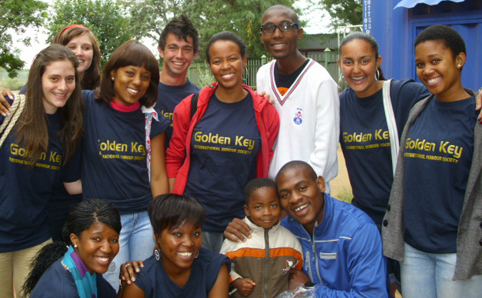 |
The management team of our university's Golden Key (GK) International Honours Society
Photo: Gerhard Louw |
Our universities chapter of the Golden Key International Honours Society is the proud recipient of the Golden Key International Chapter Service Award for the second consecutive year.
The chapter received this $1000 award in recognition of the services they deliver to the community of the Free State and the hard work each of their members put in to ensure that their community projects run smoothly.
Mr Ruddy Banyini, the chapter president, says they feel very privileged to know that the chapter’s work receives international recognition. “We feel so privileged that the work of our chapter is appreciated internationally and that it will serve as motivation to everyone to start giving back to their communities,” he said.
The UFS chapter adopted The House of Compassion, an orphanage on the outskirts of Bloemfontein, at the start of 2010. They have collaborated with associations such as the PSA and visit the house on weekends to play with the children. They have also donated food, clothing and shoes. “Our chapter’s motto is ‘It’s not how happy we are that matters, but how happy others are because of us’” Mr Banyini said.
The chapter was selected as one of the 10 most deserving chapters from a possible 390 university and college chapters worldwide, based on their community-service activities. The chapter was also selected to host the South African Regional Golden Key Summit from 06 - 08 October 2011, which means that our university will host the top 15% of achievers from all South African universities.
Mr Banyini said this is a dream come true, since their chapter’s main goal is to see our university as South Africa’s Golden Key reference point.
The GK UFS Chapter will soon be starting a “Together means Warm” campaign which will attempt to provide winter clothes, shoes and new school shoes to the children of the orphanage and also improve their living condition.
“I would like to urge everybody to keep in mind that the community is everyone’s responsibility,” Mr Banyini said.
Media Release
4 May 2011
Issued by: Lacea Loader
Director: Strategic Communication
Tel: 051 401 2584
Cell: 083 645 2454
E-mail: news@ufs.ac.za